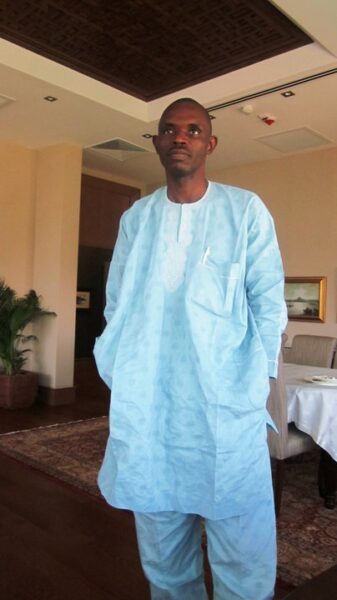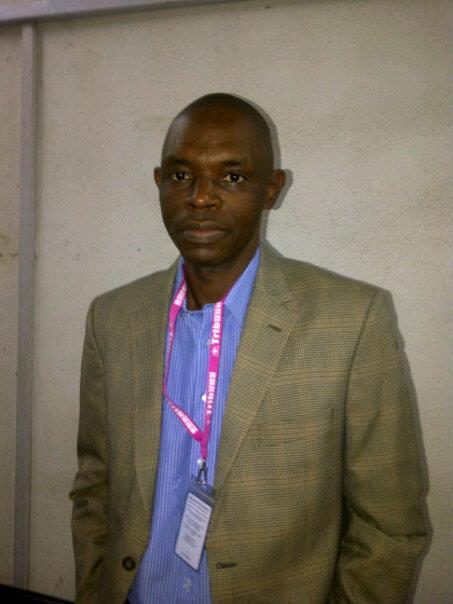By Toyin Falola
To be candid, I struggled a little to arrive at a definitive conclusion about the title of this article, and this is because the man I am writing about has made it difficult for anyone to describe him using a simple adjective. At a point, I considered settling on “Lasisi Olagunju: A Precocious Mind with Clairvoyant Thought,” but I realised that this title might fit more in a different context. Lasisi Olagunju is eclectic; his vast knowledge and expressive prowess are inspirations for anyone who appreciates the art of quality communication.
Writing is a complex level of communication that not many people are competent in. This is not because they cannot scribble out words that convey their messages but because writing itself is an art that demands a great level of attention, precision, and organisation. Many times, competent verbal communicators are reluctant to write because they understand that writing as an agency of information sharing and transmission can ultimately affect the clarity and quality of their communication. As a result, some people prefer verbal exchanges to writing, where communication feels more natural and easier to understand. However, with Olagunju, the experience is different. He has masterfully carved for himself an identity that no one can intimidate.

I begin my evaluation of his style by highlighting some of his anecdotal expressions that effectively drive home his points. Across every article and in all his columns, an avid reader can never escape the knowledge that Olagunju is a rare breed from a communicative landscape that exudes competence and class. As a thoroughbred Yorùbá, Olagunju is immersed in the aspect of African culture, which is a sign of sound intellectualism to use words according to the time, environment, and the people involved in the parties. This approach stems from the belief that miscommunication in critical situations could trigger negative consequences or instigate inciteful responses that may generate needless conflict.
For example, in his article titled “Homeless Kids Invade Southwest,” he writes that “Gúgúrú pèlú enu, won kìí s’òré títí d’alé,” which loosely translates as “the mouth and popcorn do not sustain an everlasting friendship.” The metaphoric picture painted with this language requires a good understanding of the context to grasp its full meaning. In this article, he discusses an imminent problem signalled by the unchecked influx of non-Nigerian Fulani into the Western region, a situation that is like a double-edged sword for the country as a whole and a potential problem for the people of that cultural boundary. Although the average Nigerian understands the inviolability of their country’s unity, the artistic and linguistic fraternity can upturn in a world where physical boundaries are emphasised.
Olagunju’s reference to possible fratricidal hostilities erupting from this “unholy marriage” or incursion draws on the knowledge and experience that these people do not have the moral or ideological allegiance needed to guarantee proper behaviour in the face of compelling circumstances. As Nigerians, one can be guided by the country’s moral foundations to respect the ambitions of one’s host as a sign of civilised thinking, ensuring they do not become a danger to those who accommodate them out of goodwill. However, people who illegally enter from another country do not feel obligated to respect this unwritten code. As a result, they can become a significant source of discomfort for the host if the situation is not carefully managed or controlled.

In the case of undocumented migrants, there is a history of violence and chaos that has led some hosts to bitterly regret their tolerance, as it was not reciprocated. Knowing that such migrants are unapologetic about their actions, the hosts have remained on their guard to avoid becoming victims of their good-natured disposition. So, when Olagunju wrote that the mouth and popcorn could not maintain an everlasting friendship, he meant that the influx of migrants into the country was a recipe for potential chaos.
If you do not find that use of language fascinating, here is another example that should hold you spellbound. Olagunju’s deep understanding of global politics, combined with his ability to decipher and use anecdotes where necessary, is a constant source of joy for logophiles (lovers of words). In the same article cited earlier, where Olagunju deployed ancient knowledge that would benefit his readers and make their journey into writing more exciting, he intones, “How you have felt, O men of Athens, at hearing the speeches of my accusers, I cannot tell, but I know that their persuasive words almost made me forget who I was—such was the effect of them; and yet they have hardly spoken a word of truth.”
The above expression, originally credited to Socrates, highlights the timeless value of careful language use and effective communication. During Socrates’ time, people who had a good command of their language and used it creatively were well-recognised and highly valued. Socrates remains one of the most-read philosophers of all time whose profound knowledge continues to inspire and enlighten many today, including myself. It is not hyperbolic to state that anyone who addresses the people by drawing from Socrates’ wealth of knowledge will always remain popular. It is no coincidence that Olagunju is already on that trajectory, skilfully using his mastery of language to enrich his writing.
Meanwhile, we should not overlook something very important, especially regarding how Olagunju used Socrates’ invocation of thoughts to convey his message in this context. Olagunju refers to the Northern elders, in particular, who have responded in a heavy war of attrition to his vocal and understandable displeasure with the aggressive insubordination of migrants to their hosts in recent Nigerian history. Despite being called all sorts of names, he remains undeterred, knowing that people make such comments about what you do because they are triggered by something you have persistently hammered on. For Olagunju, such prodigious deployment of words does not deter him because he understands that what must be done cannot be postponed. Also, without the knowledge and ideas he shares, people would not even understand how to respond to issues around them.

In stating his position, Olagunju maintains that people who condemn his stance on issues do not actually have reasonable or meaningful counters against his points. Their retort has always been that Olagunju is an ethnic slur that hides under conservative values to promote an ethnic agenda. This provoked his response, using the Socratic expression above to challenge his detractors on their failure to address the points that he raised. In this sense, Olagunju is a truth-teller who does not waste time to prove that.
From all indications, it is abundantly clear that Olagunju is rooted in Yorùbá culture and its rich linguistic heritage. It is common knowledge that some people are gifted with the ability to use language in a very poignant way, to the extent that communication is enhanced in the process. In Nigeria, there seems to be a common understanding that Yorùbá parents are particularly interested in raising children with a strong command of the language. Olagunju’s sentences are well-crafted and accessible, often communicating ideas that resonate with ordinary people. The simplicity of his expressions is illustrated in how well they remain vivid and clear to his readers.
Despite how long he has been writing, Olagunju consistently maintains high quality in his work. His unique use of words sets him apart from many writers, aiding in the effective transmission of knowledge through his columns. His influence on media discourse in Nigeria is undeniable, which is why his contributions always spark debates among his audience. Olagunju is known for his use of wise sayings, demonstrating that such a level of word usage could only result from a continued immersion in a knowledge system that values quality practices.

The content of Olagunju’s gifted mind is inexhaustive. When it is difficult to provide unprovocative clarity about an event, this literary enigma deploys storytelling as a tool to convey his messages to the audience. This is what I call native intelligence—a reflection of shared experiences among many Africans. Through his profound use of language and insightful writing, Olagunju continues to shape conversations and perspectives across Nigeria and beyond.
PS: This is the final of a Six-Part Series. I wish to express my gratitude to colleagues in Tanzania and Uganda for their support, which makes the environment that supports muse and reflection possible.

Ojogbon Agba: I have been waiting for when you will focus on the writing style and amazing skills of Dr. Olagunju. It’s no exaggeration to say he is on the five percentile scale of good writers I’ve experienced in all my years of reading and critical evaluation of styles. Honestly, he is non-pareil in journalistic writing in Nigeria. His ability to utilize native intelligence and intuitive knowledge produces the most organic texts and the reader is given ultimate relaxations while perusing his work. Honestly, when reading him, I cannot tell whether it is his style of language use or contents of his columns that I am captivated with. I am almost sure that I enjoy his style so much that I often have to go back and re-read his column to embrace the contents and contexts. This man is endowed with an inexhaustible repertoire of indigenous rhetorics and has an overwhelmingly wide (and wild) knowledge base of scholarly references. I hope one of these days, even if it’s going to be on a part-time basis, he will be employed by one of our universities to teach journalism, writing and systemic text linguistics. He is just too good for a society where functional literacy is an abject rarity, and no one does, or cares to do, close text readings. I won’t even talk about the fearlessness of this gentleman in his writing. He has the gallantry of a lion and I hope (and pray) he is safe. I seriously pray so. If one’s daughter is beautiful, as the Yoruba aphorism says, one should as well say it; after all one should not be misconstrued as wooing her for an in-house marriage. Olagunju is good; he is of a superior quality in journalism and writing; one may as well say it. May his tribe increase among us!
Your article holds promise with its insightful ideas and solid points. To unlock its full potential, consider delving deeper into the topic. Your clear writing and innovative approach are commendable, but injecting more energy could make it even more captivating. While your examples are effective, infusing them with more enthusiasm could truly elevate your piece. Overall, your article is well-crafted yet has room for enhancement. Strengthening your arguments and incorporating more compelling facts will further bolster its impact. With your evident talent, the potential for greatness is clear. I eagerly anticipate your future work and am excited to see how you continue to excel. Keep up the excellent work!
Your article demonstrates considerable promise, showcasing insightful ideas and a solid foundation. To elevate it to a truly outstanding level, consider the following enhancements: 1. Deepen your analysis by exploring key concepts more thoroughly, providing nuanced explanations, and addressing potential counterarguments. 2. Strengthen your arguments with additional evidence, including peer-reviewed sources, relevant statistics, and illustrative case studies. 3. Refine your writing style to engage advanced readers. Vary sentence structures, employ more sophisticated vocabulary, and ensure each paragraph flows seamlessly into the next. 4. Enhance the overall narrative arc. Craft a more compelling introduction that clearly outlines your thesis and a conclusion that reinforces your key points while highlighting broader implications. 5. Incorporate a more critical examination of alternative viewpoints to demonstrate a comprehensive understanding of the topic and pre-emptively address potential critiques. 6. Elaborate on the practical implications and real-world applications of your arguments. This will increase the relevance and impact of your work. 7. Draw connections to related fields or concepts, broadening the scope and appeal of your article while showcasing its interdisciplinary significance. 8. Consider incorporating more vivid examples or analogies to illustrate complex ideas, making your work more accessible without sacrificing depth. 9. If appropriate, include visual elements such as graphs, charts, or infographics to support your textual arguments and appeal to visual learners. 10. Ensure your conclusion not only summarizes your main points but also opens up avenues for further research or discussion, encouraging ongoing engagement with your ideas. Your innovative approach and clear writing provide an excellent foundation. By implementing these suggestions, you can transform your already solid work into an exceptional piece that resonates deeply with a professional audience and makes a significant contribution to your field. The potential for greatness in your work is evident. Your commitment to excellence shines through, and I’m confident that your continued efforts and refinements will yield truly impressive results. I eagerly anticipate seeing how you build upon these strengths in your future endeavors, further establishing yourself as a thought leader in your area of expertise.
Your article demonstrates considerable promise, showcasing insightful ideas and a solid foundation. To elevate it to a truly outstanding level, consider the following enhancements: 1. Deepen your analysis by exploring key concepts more thoroughly, providing nuanced explanations, and addressing potential counterarguments. 2. Strengthen your arguments with additional evidence, including peer-reviewed sources, relevant statistics, and illustrative case studies. 3. Refine your writing style to engage advanced readers. Vary sentence structures, employ more sophisticated vocabulary, and ensure each paragraph flows seamlessly into the next. 4. Enhance the overall narrative arc. Craft a more compelling introduction that clearly outlines your thesis and a conclusion that reinforces your key points while highlighting broader implications. 5. Incorporate a more critical examination of alternative viewpoints to demonstrate a comprehensive understanding of the topic and pre-emptively address potential critiques. 6. Elaborate on the practical implications and real-world applications of your arguments. This will increase the relevance and impact of your work. 7. Draw connections to related fields or concepts, broadening the scope and appeal of your article while showcasing its interdisciplinary significance. 8. Consider incorporating more vivid examples or analogies to illustrate complex ideas, making your work more accessible without sacrificing depth. 9. If appropriate, include visual elements such as graphs, charts, or infographics to support your textual arguments and appeal to visual learners. 10. Ensure your conclusion not only summarizes your main points but also opens up avenues for further research or discussion, encouraging ongoing engagement with your ideas. Your innovative approach and clear writing provide an excellent foundation. By implementing these suggestions, you can transform your already solid work into an exceptional piece that resonates deeply with a professional audience and makes a significant contribution to your field. The potential for greatness in your work is evident. Your commitment to excellence shines through, and I’m confident that your continued efforts and refinements will yield truly impressive results. I eagerly anticipate seeing how you build upon these strengths in your future endeavors, further establishing yourself as a thought leader in your area of expertise.